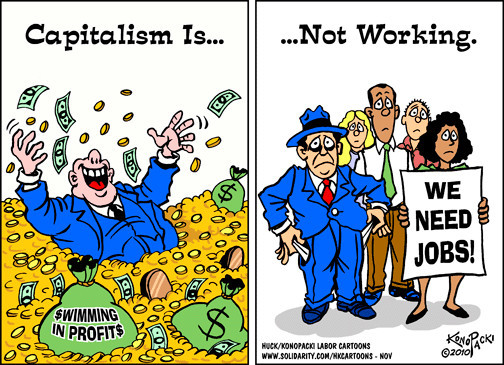By Daniel Margrain

“If we don’t get inequality under control then it’s likely to lead to war. Inequality and the rise of a super rich elite is undermining the foundations of capitalism. The trappings of capitalism could be swept away by the pitchfork of revolution unless capitalism is fundamentally re-imagined.”
The above is not a quote by Jeremy Corbyn, Nicolas Maduro or Bernie Sanders, but by American venture capitalist, Nick Hanauer. During a 2015 interview with BBC journalist Stephen Sakur, Hanauer said, “If capitalism doesn’t change fundamentally, it will destroy itself.”
“In my state”, he said, “since 1990, close to 100% of growth has been accrued to just 1% of the top earners. People are beginning to get angry and increasingly less patient with a system that rewards nearly all of the benefits of growth to a tiny minority at the top.”
This ‘gushing upwards’ of capital towards the top of the socioeconomic pyramid is not indicative of regulated free-markets, but an extreme form of crony capitalism in which the publicly owned assets of the state are systematically stripped and the spoils distributed to an elite economic and political class.
The potential bailing-out of Carillion, farm, housing and rail subsidies, public sector retrenchment, quantitative easing and share giveaways, are some of the ways in which corporate welfare continues to greatly enrich the wealthiest in society. Figures reported in the Guardian indicate that the richest 1% in Britain have as much wealth as the poorest 57% combined.
No morality
Hanaeur is clear that his argument isn’t intended to be a moral one but a pragmatic solution to a growing crisis: “I’m not saying that we capitalists should pay workers more because we feel sorry for them. But the more they get paid, the better it will be for venture capitalists like me”, he said.
Hanaeur added:
“The more money ordinary folks make, the greater the opportunity people like me have to innovate, create enterprises and sell them stuff. The better they do, the better I do.”
When Theresa May recently described capitalism as the “greatest agent of collective human progress ever created”, what she failed to grasp, but what Hanaeur understands, is that economic growth is the culmination of collective human labour. In other words, it’s the latter that gives rise to what Hanaeur terms a “thriving middle class”, not the other way round.
Similarly, in her critique of the austerity myth, author of The Production of Money, Ann Pettifor, argues cogently that “taxes are a consequence of investment and spending. They are not its cause.” The cornerstone of Tory economic policy is not to invest to stimulate the economy in order to boost growth and generate tax revenues, but on the contrary, to attack the welfare state and public sector which has the reverse affect.
What Theresa May and other apologists for the existing system really mean, is not that capitalism is the “greatest agent of collective human progress ever created”, but rather that neoliberalism is the best economic model through which the elite class are able to financially enrich themselves by manipulating the institutions of society.
It is not only leading politician’s on the political right of the spectrum who apparently have difficulty in untangling socio-environmentally protected notions of free trade from the cronyism associated with its neoliberal capitalist variant, but mainstream political commentators also. On Twitter (January 17), for example, radio presenter Julia Hartley-Brewer, spectacularly mischaracterized Jeremy Corbyn’s correct evaluation of the Carillion crisis.
Presumably, Hartley-Brewer is of the opinion that consumer-based capitalist economies can be driven with only the extreme wealth of the few and that any attempts to buck the market by ensuring that employers pay their staff a minimum wage of say £10 an hour will bring the said economies to their knees?
Reining-in
Hanaeur, whose primary motivation is to make money, recognises the absurdity of this kind of ‘booster of globalization’ argument. In the BBC interview outlined above, the venture capitalist argues that rather than being set free by deregulation, capitalism needs to be controlled through a system of planned and coordinated regulation:
“Capitalists have the idea that their things will be bought by everybody else as a result of higher wages paid by other capitalists”, he said.
Hanaeur added:
“But this logic of paying higher wages to staff to help improve business activity more generally, is resisted since capitalists will insist on paying their own workers next to nothing thereby not absorbing the costs themselves.”
Hanaeur’s argument can essentially be summarized thus: There is a need for capitalism to be reined in, in order to save the system from the rapacious actions of competing capitalists who are driven, as Marx put it, by their need to “accumulate for accumulations sake”.
In principle, Hanaeur’s view is no different from the minority of capitalists in 19th century Britain who argued in favour of the introduction of the Factory Acts of the 1830s and 1840s which set down a maximum length for the working day.
Hanauer’s pragmatism is closer to Jeremy Corbyn’s vision for society than it is to Theresa May’s and underscores the undeniable truth that the ability to accumulate for accumulations sake doesn’t necessarily lead to higher profits.
Contradiction
One of the contradictions inherent to capitalism is that the system as a whole needs to spend money to make profits, yet every individual capitalist wants to spend as little as possible. The lengths to which giant companies like Amazon, Google and Starbucks will go in order to avoid paying tax shows how this dilemma is played out.
The failed neoliberal austerity experiment is what economist Paul Krugman describes bluntly as “a con that does nothing but harm the wealth [of nations]. It has been discredited everywhere else: only in Britain do we cling to the myth”, he said.
Contrary to mainstream media mythology, Corbynism and the notion of a reformed capitalism are, counter-intuitively, congruous concepts. It’s not only aspects like health and social care that are safer the further they are, ideologically, from neoliberalism, but from the perspective of capitalism’s longevity, so is the economy.
Please make a small donation
If you’ve enjoyed reading this or another posting, please consider making a donation, no matter how small. I don’t make any money from my work, and I’m not funded. You can help continue my research and write independently.… Thanks!






